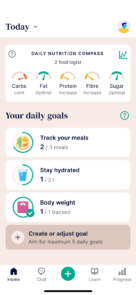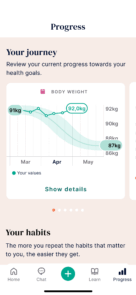
Can doctors help with weight loss?
Yes, your doctor can help you with weight loss. In fact, in the UK, there’s a lot of professional support available to you. Here, we’ll cover how your GP can help you lose weight.
Did you know your doctor can even refer you to a weight loss programme like Oviva’s by checking your eligibility? Personalised medical weight loss support with your own team of healthcare professionals, weight loss medication and more, funded by the NHS.
Want to get started with weight loss help from your GP? Download our info pack! It’s got everything you need to take to your doctor and start the conversation.
Key Takeaways
- Your GP can provide personalised support to help you lose weight effectively and safely.
- Eligible patients may access specialised weight loss programmes like Oviva, proven to deliver results.
- The treatment offered may depend on your BMI and any weight-related health problems.
What can my GP do to help me lose weight?
When you approach your GP for weight loss support, they may offer a range of options tailored to your needs. Depending on your situation, these could include medical tests, lifestyle guidance, mental health support, or referrals to specialist services. Here are some of the ways your GP can assist you:
Test you for underlying conditions
If you are really struggling to lose weight despite making lifestyle adjustments, there may be a medical reason behind it. Conditions like hyperthyroidism, PCOS, diabetes, and Cushing’s syndrome can make it more difficult to lose weight.
When going to see your GP for help with weight loss, they can test you for any underlying conditions so you can get the right treatment and better understand the weight loss journey that is right for you.
For example, your doctor might order a blood test that measures your thyroid-stimulating hormone levels and can detect whether you have a thyroid disorder.
Your GP may also recommend an HbA1c test. This test measures your average blood glucose levels over the last two months and can help determine whether you are at risk for pre-diabetes.

Lifestyle support
GPs can offer lifestyle support to help with weight loss, particularly if you’re experiencing overweight but your BMI is under 35.
Your GP might give you an eating plan or support you in joining an NHS weight loss initiative such as the Couch to 5K running programme. Some GPs also refer patients to weight loss support groups, such as WW or Slimming World. For some, these lifestyle changes are enough; however, many others find themselves frustrated and need more support or intervention.
Mental health support
If you are on a weight loss journey, it could be helpful to explore any underlying emotional or psychological factors that may be making your weight management journey difficult. The link between mental health and weight management is clear, so if you’re struggling, please know you’re not alone and your doctor is there to help you.
Your GP can refer you to NHS mental health services like talking therapies or CBT. Oviva doesn’t offer mental health treatment but supports behaviour change through psychology-led tools.
This clear link is why our weight management service includes access to psychologists who can support your mental health journey and help you build healthy habits as you manage your weight.
Weight loss medication
While your GP may be unable to directly prescribe weight loss medication such as Wegovy (semaglutide), if you’re eligible, they can refer you to a specialist weight management service where a clinician can prescribe NHS-funded weight loss injections.
Eligibility criteria includes location, a BMI over 35 (27.5 for people from ethnic minority backgrounds) and at least one weight-related health condition.

Referral to a weight management programme
You may have heard of tier 3 weight management services, but what does this mean for you and your weight loss journey? The NHS categorises its weight management programme into 4 tiers of healthcare:
- Tier 1 consists of universal services available to anyone
- Tier 2 introduces light interventions, such as lifestyle changes
- Tier 3 is a weight management programme, a more holistic approach your GP may refer you to if you meet the criteria.
- Tier 4 includes bariatric surgery and other specialist services.
The Oviva programme is a tier 3 weight management programme designed to help you achieve sustainable weight loss through:
- Personalised support from dietitians
- Tailored meal plans
- Behavioural coaching
- Weight loss medication delivered to your door
- An easy app that provides access to your dietitian, meal plans and progress tracking, plus the flexibility to manage your weight anytime, anywhere.
Oviva patient success stories:

 -22kg
-22kg
Heidi (53)

 -25kg
-25kg
Martin (34)

 -32kg
-32kg
Patricia (53)
Surgery
Bariatric surgery refers to a range of weight loss procedures that alter your digestive system to help you lose weight. These surgeries include gastric bypass, sleeve gastrectomy, and adjustable gastric banding.
Bariatric surgery is BMI-dependent and often considered after all other weight loss options have been explored, as it involves significant changes to your body and lifestyle.
Your GP can assess whether you meet the necessary criteria, typically based on your BMI and other health factors. If you are eligible, your GP will refer you to a specialist team who will guide you through the process.
Before surgery can be approved, you will generally be required to demonstrate your commitment to long-term lifestyle changes, including a period of weight loss, to ensure you’re physically and mentally prepared for the procedure. Bariatric surgery is not a quick fix but a significant decision requiring careful consideration and a long-term commitment to change.
How to talk to your GP about weight loss
Sometimes, the first step is the hardest. Maybe you’re worried that your doctor will judge you or blame you for something that isn’t your fault. You might have had bad experiences with medical professionals and fear the same thing happening again.
However, your quality of life and happiness are essential, and healthcare professionals are there to support you. Therefore, to access the care you need or be considered for weight loss medication, you’ll need to speak to a professional. Remember that they are here to help you.
- It may help if you write down any questions or concerns in advance so you can address them during your appointment.
- Make a list of things you’ve done to lose weight, how long you tried them, and what happened, and consider why they haven’t worked so you can let your doctor know.
- You could also mention when you started to gain weight, as there may have been a trigger that points to some underlying psychological reason.
- Let your GP know how your weight is affecting your life and how motivated you are to make changes.

Questions to ask your GP if you want help losing weight
- How is my weight affecting my health right now?
- (If you are taking medication) Do any of my medications have weight gain as a side effect?
- Can you refer me to a weight management service? If not, what else would you suggest I do?
Knowing what you’re eligible for on the NHS
The NHS has four tiers of weight management help. Eligibility depends on your BMI and other factors.
Tier 1 is open to everyone over the age of 18 and targeted at people with a BMI of 25 and above. It consists of lifestyle advice and support and is primarily focused on self-care.
Tier 2 is for people with a BMI of 35 or more or those with a BMI of 30 and relevant co-morbidities (such as type 2 diabetes). It introduces counselling, dedicated exercise programmes, and the help of a dietitian.
Tier 3, available for people with a BMI of 40 or more or 35 with co-morbidities, is a multidisciplinary approach. It involves weight loss management programmes that tackle the issue holistically through weight loss medication, diet support, counselling and more.
Tier 4 is for patients with a BMI of 40 or more or 35 with some co-morbidities. It offers serious interventions such as bariatric surgery.
If you want to know more about what you could access, speak to your GP.

What if your GP is reluctant to offer weight management support?
It can be frustrating and discouraging if you feel like your concerns about weight loss aren’t being fully addressed by your GP. You might leave feeling unheard or unsupported. This doesn’t mean your weight loss journey is over—there are still steps you can take to move forward.
Ask for clarification
If your GP doesn’t suggest the support or treatment you were hoping for, ask them to explain why. They may believe a different approach is better for your specific situation, or they might have misunderstood your concerns. Clear communication can help align your goals and expectations.
For example, if your GP says weight management services aren’t available in your area, you can let them know about the NHS Right to Choose framework, which allows you to access any qualified provider regardless of location.
Oviva’s weight management programme, for instance, is delivered remotely and available across England. If they’re not sure how to refer you, you can share this page with them which explains how they can refer patients to Oviva.
Request a second opinion
If you still feel your concerns aren’t being addressed, you have the right to ask for a second opinion from another GP. This is a standard NHS process and can give you the opportunity to speak with someone who may offer a different perspective or more proactive support.
Explore community resources
If formal support through your GP isn’t accessible, consider alternative options like local weight management groups, online communities, or NHS digital tools such as the Couch to 5K app or the NHS weight loss plan. These free resources provide structure, motivation, and a sense of community to support your weight loss journey.
When your GP believes you’re not eligible
Eligibility for weight management services depends on factors like your location, BMI and weight-related health conditions.
If you think you meet the criteria for more specialist care, such as Oviva’s Tier 3 programme, explain your case.
If lifestyle changes aren’t enough
If you’ve already tried lifestyle changes without success, be honest with your GP about what you’ve attempted, how long you tried it, and why it didn’t work. This can help your GP understand why you might need additional support, such as weight loss medication, a Tier 3 referral, or psychological counselling.
Take small steps toward your goals
Even without direct GP support, small, manageable changes—like walking more, tracking your meals, or finding activities you enjoy—can help you make progress. These steps can also demonstrate your commitment if you revisit your GP for further support.
Persistence pays off
Navigating the healthcare system can be challenging, but persistence and clear communication are key. Remember, you deserve to be heard, and there are multiple pathways to get the support you need.

Getting professional support
Oviva offers a comprehensive weight loss programme on the NHS to help you achieve long-term weight loss.
With Oviva, you’ll receive expert care and personalised treatment plans tailored to your needs by doctors, dietitians, nurses, and psychological practitioners. The fully remote programme offers flexible support through our free app, helping you build sustainable habits for long-term success wherever you are.
97% of users would recommend Oviva, and the programme has helped over 1,000,000 people lose an average of 13.6kg in 12 months. Find out more about how Oviva’s programme works.
To get started, take our free info pack to your GP and ask them to check your eligibility!








